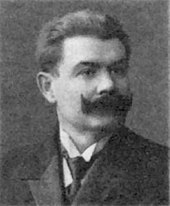Ernst Remmers
Ernst Remmers (born July 9, 1868 in Gehrden ; † April 10, 1937 in Berlin ) was a co-founder and first chairman of the German Association of Civil Servants and a co-founder and member of the DDP .
Organizer of civil servants' interests
Remmers worked as a civil servant at the post office between 1887 and 1894. Early on, he took part in the organizational efforts of the middle-class officials. From 1895 he published the magazine “Der Postbote”. In 1900 he became editor of the “Deutsche Post” magazine and was a co-founder of the Association of Lower Post and Telegraph Officials. He became its general secretary in 1909. Between 1909 and 1911 he was a co-founder and board member of the Federation of Fixed Salaries. During the First World War in 1916 he was involved in founding the interest group of German civil servants' associations. He was also a member of the board of the War Committee for Consumer Interests and Treasurer of the People's League for Freedom and Fatherland . The German Civil Service Association emerged in 1918 from the community of interests of civil servants' associations. Remmers became the first chairman of the new organization.
From 1928 to 1933 he belonged together with Albert Falkenberg and Max Wagner to the management of the 1928 founded "Beamtenbausparkasse, Heimstättengesellschaft der Deutschen Beamtenschaft mb H." (BBS) in Berlin, chaired by the land reformer Johannes Lubahn , who is considered to be their founding father was a close friend of Adolf Damaschke . After the alignment in 1933, the BBS emerged as a building society for the public service, which gradually changed to the general financial service provider BHW after the loss of non-profit status in 1976 .
politics
Remmers was also politically active during the German Empire. He was chairman of the Progressive People's Party in Berlin-Niederschönhausen and the surrounding area. A candidacy for the Reichstag had failed in 1907. In 1918 Remmers was one of the signatories of the DDP's appeal for founding. As early as 1919 he resigned as chairman of the DBB because he entered the Weimar National Assembly for the DDP . As director of the DBB, he remained closely associated with the civil service organization.
He published various writings, in particular on civil servant issues.
Individual evidence
- ↑ Herbert Kleinschmidt: History, ideas and socio-economic significance of the building society savings scheme , published by Felix Meiner, Leipzig 1934, p. 65
Web links
- Literature by and about Ernst Remmers in the catalog of the German National Library
- Ernst Remmers in the database of members of the Reichstag
- Ernst Remmers in the online version of the Reich Chancellery Edition Files. Weimar Republic
| personal data | |
|---|---|
| SURNAME | Remmers, Ernst |
| BRIEF DESCRIPTION | Civil servant and politician (DDP) |
| DATE OF BIRTH | July 9, 1868 |
| PLACE OF BIRTH | Gehrden |
| DATE OF DEATH | April 10, 1937 |
| Place of death | Berlin |
